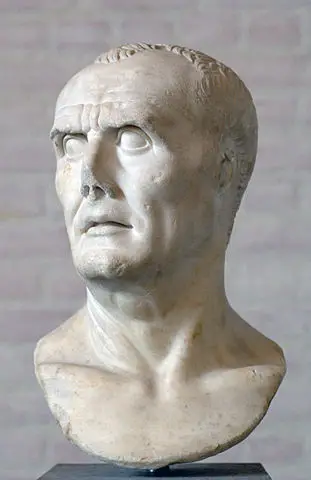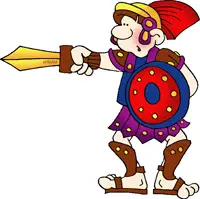Gaius Marius
One of the great leaders of the Roman Republic was Gaius Marius. He was the only Roman to be elected to consul seven times.
His political actions throughout life strengthened the Roman army and helped the common people of ancient Rome. Gaius Marius was responsible for making the Roman Republic one of the most dominant civilizations of the world.

Early years
Gaius Marius was born in a small town named Arpinum in 157 B.C.E. It is truly unknown whether his family was wealthy. Some scholars believe he was born into a family of the equestrian class.
Most historians consider him a plebian or common person and not from a family of wealth or patrician. Marius probably had little education when he was a child because of his family’s status.
Political career
As a young man, Gaius Marius wanted to have a political career. When he was 23 years old, Marius was part of the Roman army in North Africa.
The first time he ran for the election was for one of the special 24 military tribunes. Although not known by sight in public, he was elected on his accomplishments in North Africa.
Gaius Marius tried to run for office in Aprinum but was rejected by the voters. He was then elected as a quaestor several years later. In 120 B.C.E., Marius was elected as a Plebian Tribune.
As a Plebian Tribune, he was well-liked by the people but hated by the patricians or wealthy people. One of his bigger achievements as a Plebian Tribune was changing the way votes were counted in elections. His law prohibited patricians from harassing the voters during election time.
Marius would lose several new elections until in 116 B.C.E. when he won a praetor seat. He was acquitted of corruption in 114 B.C.E. and sent to Spain to be the governor. Here he led a successful but minor military campaign but increased his wealth tremendously.
He would return to Rome in 110 B.C.E., where he married Julia, the aunt of Julius Caesar. This would solidify his position as a patrician.
Consul
Gaius Marius was first elected to the consul in 108 B.C.E. after a triumphant military campaign in Jugurtha. He would later be elected a record number seven times as consul over his political career.
Marius’s biggest achievement as consul was to change the recruiting practices of the Roman army. While Marius was consul, Italy was invaded by the Germanic barbaric tribes. It was important for Marius to raise a large army to fight off the barbarians. He then started to create a Roman army of the people.
Before the change of law, the Roman army could only recruit men from wealthy families. In 107 B.C.E., Marius was successful in allowing landless men into the Roman army. This action turned the Roman army from wealthy men to poor men with the hope of gaining property after their service.
The new law made Roman soldiers directly support their leaders. Roman soldiers also received a salary for their services, plenty of weapons, and armor too. The new recruitment law was a boom for ordinary citizens in Rome.
There were other changes to the Roman military. Soldiers signed up for 25 years of service. He rewarded retired soldiers with land grants. Improvements to the Roman army included new battle tactics, forming select military groups specializing in specific weapons and tactics, and he installed the eagle as the principal emblem of the Roman army.
Later years
Gaius Marius led several successful military campaigns from 107 B.C.E. until 98 B.C.E. Over the years, Gaius Marius made numerous patrician enemies. During the Civil War of 91 B.C.E., Marius found himself on the side of Sulla fighting against rebellious cities.
Eventually, the tides would turn, and Marius found himself on the other side of Sulla in 87 B.C.E. During his reign as consul for the seventh time, Gaius Marius died of fever in 86 B.C.E.
Important facts about Gaius Marius
- Gaius Marius was born in Aprinum in 157 B.C.E. He was probably a plebeian or common person. He did not have much of an education.
- After serving in the Roman army in North Africa, he won his first political post as a quaestor. He was then voted into office as a Plebian Tribune for the people.
- Gaius Marius was elected to consul seven times in his lifetime. This was never accomplished again in ancient Rome.
- He served as governor of Spain, where he accumulated wealth and further honed his military skills.
- Gaius Marius married Julia, the aunt of Julius Caesar.
- He made significant changes to the Roman army while he was consul. Ordinary people joined the Roman army for 25 years of service. Gaius Marius paid the troops and supplied them with equipment after service soldiers were awarded property for their services.
- He was not a favorite of the patricians or wealthy people of ancient Rome. Marius was able to secure elections with new laws that prohibited the patricians from interfering with elections.
- Sulla tried to assassinate Gaius Marius several times but was unsuccessful. He would die of fever during his seventh term as consul.
Questions
What was the first political office that Gaius Marius held?
Quaestor
What Roman dictator was the nephew of Gaius Marius’ wife?
Julius Caesar
How many times was Gaius Marius elected as a consul?
Seven
Who did Gaius Marius allow to enter the Roman army?
Common men
Gaius Marius was the governor of what Roman province?
Spain



